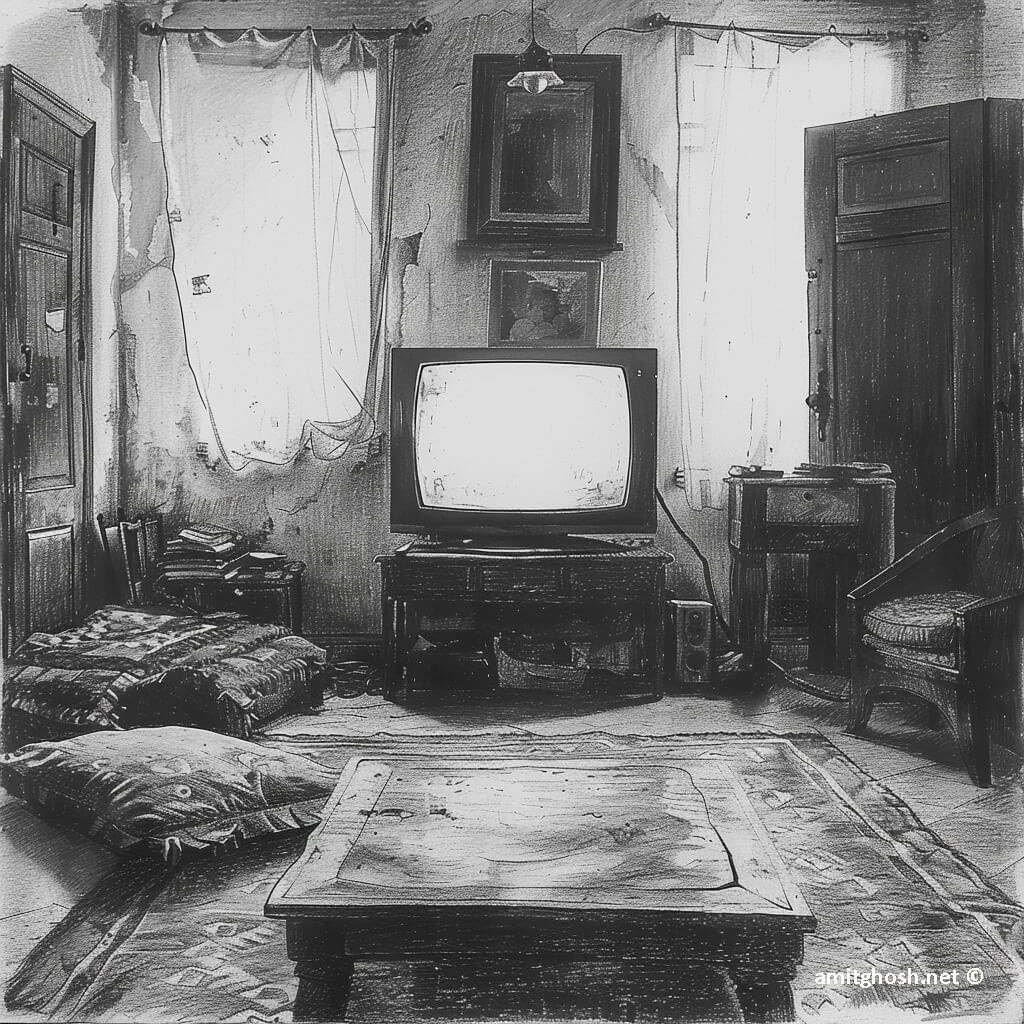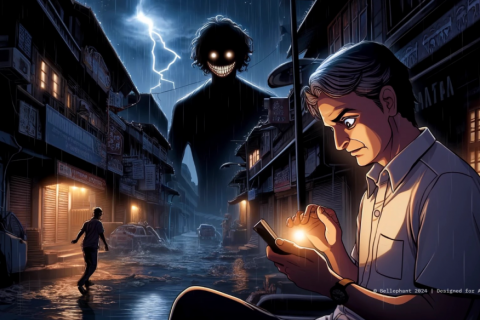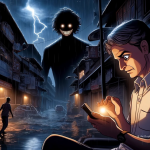1
Arpan lived in a small, forgotten town where the days stretched long and the nights even longer. He was a simple man with a complicated past, a past he kept hidden behind a crooked smile and tired eyes. Nobody in the town knew much about Arpan, and Arpan preferred it that way.
He lived alone in a rundown house at the edge of town, a house that seemed to sag under the weight of years of neglect. Moss crept up the sides, and the windows were cracked and dirty. But Arpan didn’t seem to mind. He spent most of his days sitting on the porch, staring out at nothing in particular, lost in his own thoughts.
Arpan’s life hadn’t been easy. He’d seen things and done things he wasn’t proud of, things that haunted him in the quiet hours of the night. But he never talked about it, never let anyone in. He was a closed book, and the townsfolk had long ago stopped trying to read him.
As the years went by, Arpan grew lonelier and more withdrawn. He lost touch with the world outside his door, lost touch with himself. He was adrift in a sea of memories, drowning in regrets.
And then, one cold winter’s night, Arpan didn’t come out of his house. The townsfolk whispered among themselves, wondering where he was, and what had happened to him. But nobody dared to go and check on him. Arpan was a mystery, and mysteries were best left unsolved.
Days passed, and still, Arpan didn’t emerge. Finally, one brave soul ventured up to the old house and knocked on the door. There was no answer. The door creaked open, revealing a darkness so thick it seemed to swallow the light.
The brave soul stepped inside, calling out for Arpan. But there was no response, only silence. They made their way through the house, searching every room, every corner. And then, they found him.
Arpan was lying on the floor of his bedroom, his eyes closed as if he were asleep. But he wasn’t asleep. He was gone, his spirit slipping quietly away in the dead of night, leaving behind nothing but memories and a town that would soon forget him.
And so, Arpan’s story came to an end, a quiet, unremarkable end befitting a quiet, unremarkable man. He was buried in the town cemetery, a forgotten soul in a forgotten town.
And as the years passed, his name faded from memory, lost to the winds of time. But somewhere, deep down, Arpan’s story lived on, a whisper in the dark, a shadow in the night.
2
Arvind stood on the edge of his balcony, the cold metal railing pressing against his trembling hands. His fingers gripped tightly around the hilt of the knife, its blade glinting in the moonlight. He stared out into the darkness, the weight of his grief pressing down on him like a leaden sky.
His children were gone, taken from him by a cruel twist of fate. Leukemia had stolen their laughter, and their smiles, leaving behind only memories stained with tears. His wife, unable to bear the pain any longer, died a few weeks later, leaving Arvind alone with his sorrow.
But tonight, Arvind had reached his breaking point. The pain was too much to bear, the emptiness too vast to fill. He felt as though he were drowning in a sea of grief, each wave crashing over him with relentless fury.
As he stood there on the edge, the knife trembling in his hand, a voice echoed in the depths of his mind. It was a whisper, soft and insistent, urging him to end it all, to embrace the darkness and escape the pain once and for all.
But just as Arvind’s resolve began to waver, a faint glimmer of light appeared on the horizon. It was a tiny spark, barely visible against the vast expanse of the night sky, but it was enough to catch his attention.
Slowly, almost reluctantly, Arvind lowered the knife from his throat and took a step back from the edge. He blinked away the tears that blurred his vision, the weight of his sorrow still heavy upon his shoulders.
But as he gazed out into the night, he realized that there was still hope, still a flicker of light in the darkness. And though the road ahead would be long and difficult, Arvind knew that he wasn’t alone. Somewhere out there, amidst the shadows and the stars, there was a glimmer of hope waiting to be found.
But just as he turned away from the edge, a sudden sound shattered the silence. It was a low, guttural growl, coming from somewhere in the darkness below.
3
Arpan slowed his pace as he approached the commotion outside Arvind’s apartment building. He glanced around, trying to figure out what was going on.
“What’s happening here?” he asked, stepping closer to a group of people huddled together near the entrance.
An older man, recognizable as the local shopowner, turned to Arpan with a troubled expression. “It’s bad news, buddy,” he said, shaking his head. “Arvind, he… he jumped from the seventh floor last night. It’s a suicide.”
Arpan’s heart sank at the revelation. He knew Arvind, and had seen him around the neighborhood before. The idea of someone he knew taking their own life was hard to grasp.
“Why would he do something like that?” Arpan asked, feeling a mix of shock and sadness.
The shopowner sighed heavily, his voice tinged with regret. “Well, word is Arvind was going through some tough times,” he explained. “Lost his kids to leukemia, and his wife left him. I guess it all got too much for him.”
Arpan shook his head in disbelief. It was hard to imagine the kind of pain Arvind must have been feeling to take such drastic action.
“But still, to end it all like that…” Arpan trailed off, struggling to find the right words.
“Yeah, it’s a real tragedy,” the shopowner agreed, his tone somber. “Just goes to show, you never know what someone else is going through. We gotta look out for each other, you know?”
As they spoke, the heat of the day seemed to intensify, sweat beads forming on the brows of those gathered in the bustling marketplace. Among the crowd, an aunty, fanning herself with the pallu of her saree, listened intently. Her expression was one of discontent, not just from the stifling heat but from the throng of people that had gathered, adding to the commotion and stifling the air even further.
Hearing Arpan and the shop owner’s conversation, she couldn’t help but interject. Wiping the sweat from her brow with a swift motion of her saree, she announced, “No leukemia. I heard he killed his own son and wife when he went to his mother’s place last year.” Her voice carried a mix of sorrow and a strange pride in revealing the secret.
The shop owner and Arpan turned towards her, taken aback by her sudden participation in their discussion. The aunty, undeterred by their surprise, continued, “Their family has covered it up, but the maid of his overheard a conversation between Arvind… but strangely, there was no one in the room when Arvind was talking. Then their maid told our maid.”
“These aunties are called Pepsi aunties for a reason,” Arpan thought, acknowledging her reputation for being overly interested in other people’s affairs. She was proud of her nosy knowledge, a local sleuth in her own right.
The shop owner, looking from Arpan to the aunty, finally said, “Seems like there’s always more to the story. We really do need to keep an eye out for each other.”
Arpan nodded, his mind racing with thoughts. He couldn’t shake the feeling of sadness that lingered in the air, but he knew the shopowner was right. Maybe if people were more aware, and more caring, tragedies like this could be avoided in the future.
Suddenly He felt engulfed in a cold, unsettling fog.
4
Akruti ran as fast as her little legs could carry her, tears streaming down her cheeks. She didn’t know where she was going, only that she needed to escape the anger and pain that filled her home.
But then, disaster struck. She slipped on the wet sidewalk, crashing to the ground with a cry of pain. Her knee throbbed, but it was nothing compared to the ache in her heart.
“Why had Daddy screamed at me?” she wondered aloud, her voice trembling with confusion and hurt. “I didn’t do anything wrong…”
As she lay there, feeling lost and alone, a voice broke through the haze of her thoughts.
“Little girl, are you alright?”
Akruti looked up to see a man standing over her, his face as pale as the moon. His eyes were dark and deep, like the murky depths of a swamp at night. She gasped at the sight of him, but strangely, she didn’t feel as scared as she thought she would. There was something about him that put her at ease, despite his eerie appearance.
“I slipped,” Akruti explained, her voice small and shaky. “Daddy got mad at me… I don’t know what I did wrong. He started screaming, and then he… he smacked me hard on the face.”
The man listened quietly, his expression unreadable. Then, with a gentleness that surprised her, he reached out and lightly touched her cheek. Akruti winced at the touch, feeling the sting of her father’s blow all over again.
Her eyes widened as she looked up at the man, a flicker of fear creeping into her heart. But to her surprise, he smiled at her, a smile that sent shivers down her spine.
“It’s alright, little one,” he said softly, his voice like velvet. “You’re safe now.”
But as he spoke, Akruti couldn’t shake the feeling that there was something dark and hungry lurking behind his smile. She shivered, suddenly unsure of the stranger who had appeared out of nowhere to offer her comfort in her time of need.
5
The moon cast a soft glow over the quiet street, but it was the faint light that revealed a disturbing detail on his face—a scar on his left cheek, jagged like a bolt of lightning. Akruti noticed this as she glanced up at him. His eyes were too dark, a stark contrast to his usually stoic expression which had now returned.
“Why don’t I take you home? Everything will be alright,” he said gently, breaking the silence. His hand was soft but firm as it clasped hers, helping her to her feet.
Akruti managed a small smile, comforted yet uneasy, and nodded. Together, they walked into the thick fog that enveloped them, swirling around like an ominous fire without heat.
As they walked, the silence hung heavily between them, filled only by the distant sound of a night creature stirring in the darkness. The mist felt alive, moving and reshaping itself as if it were trying to whisper secrets. Akruti shivered, not from the cold but from the creeping dread that something was amiss.
“Sometimes, the fog feels like it’s hiding things,” she murmured, her voice barely above a whisper.
He looked down at her, his expression unreadable. “Sometimes, it does. But remember, it also means we’re not alone. We have each other.”
The reassurance in his tone was meant to comfort her, but the shadows in his eyes told a different story—one of sorrow and secrets. Akruti wanted to ask more, to dive into what haunted the depths of those red eyes, but she hesitated, fearful of what she might uncover.
6
The next morning, the fragile peace of the night was shattered by the grim news that echoed through the quiet streets. A little girl had died tragically, two hours after a brutal beating. The early morning news reported it with a detached sadness. The beatings hadn’t killed her; it was the deep, precise cut across her throat that ended her young life.
Her parents had met the same fate, their lives claimed by similar brutal slashes. The police suspected a grim narrative of familial destruction—perhaps the father, overwhelmed by guilt, had lashed out against his family before turning on himself. Yet, the absence of the murder weapon posed a haunting question: where was the knife?
Rumors began to swirl among the locals as they pieced together the events, their fear tangling with the morning fog. The community was left to wonder and whisper about the darkness that lurked in the hearts of those they thought they knew.
Two old ladies sat in a cozy living room, the glow from the television casting shadows on their concerned faces. The news of the tragic deaths played again, causing a stir of emotions.
One of the ladies, her voice heavy with grief for the young girl and her mother but laced with disdain for the father, broke the silence. “Isn’t it strange that they all died with their throats slit?” she mused, her brow furrowed.
Her friend, knitting needles paused in mid-air, looked puzzled. “How is that strange?”
“Well, you see,” the first lady began, her tone dropping to a whisper as if the walls themselves might overhear, “Arvind told me something chilling. Just last year, a man took his own life with a knife. He’d been utterly discouraged—bankrupt, abandoned by his wife, and his children had succumbed to leukemia.”
She paused, ensuring her friend was following along. “Before he died, he left a note. He declared his intention to end the suffering of anyone living a life as bleak as his was. It’s only too bad, he thought, that he wouldn’t have the chance to do so. He was deeply depressed, all confused. Isn’t it fortunate, though, that he didn’t have the chance to carry out his dark wishes?”
“Yes, it is fortunate,” her friend agreed softly, setting her knitting aside. “The poor fellow. What did he look like?”
“Well,” the first lady continued, leaning closer as if to share a secret, “he was described as a man in his early middle age, pale as death—as if no sunlight ever touched him. His eyes were dark as the swampy lake at night…” She hesitated for a dramatic effect, then added, “and he had a scar on his left cheek, jagged like a bolt of lightning.”
Both women shivered, the eerie description settling over the room like a cold fog. The second lady glanced back at the flickering TV screen.
In the kitchen, the scent of spices and rice wafted through the air as Arvind’s wife diligently prepared dinner. She could hear the TV’s sporadic static from the living room, a sound all too familiar in their household. It was an old model, stubborn and unpredictable, much like Arvind’s mother, who had her own quirks.
Arvind’s mother, a feisty octogenarian with a sharp tongue, often blamed the neighbors whenever the TV flickered. “Why you people stealing my electricity!” she would shout indignantly out the window, convinced of their petty thievery.
This peculiar accusation had become one of those endearing if exasperating, perks of her old age. Arvind’s wife, accustomed to the outbursts and the old TV’s antics, stepped nonchalantly into the living room. With a practiced air, she approached the television. She eyed it with a mix of affection and irritation as if facing an old adversary.
Then, with a humor-filled grin, she delivered a tight slap to the side of the TV—an ancient technique passed down through generations, half in jest, to “fix this old piece of junk,” as she often called it. To the amusement of the ladies in the room, the screen instantly cleared, restoring the newscast to its crisp, visual clarity.
“Oh, there we go!” she exclaimed triumphantly, her hands on her hips as she turned to the old ladies with a playful shrug.
The television replied in the war. It started flickering again.
7
The laughter slowly faded from the room as the crisp images on the television continued to flicker across the screen. But a sense of unease began to creep back, thickening the air once more. Something was amiss. Arvind’s mother, usually quick to respond with a sharp retort or a witty remark, remained unusually silent.

Her stillness was uncharacteristic, and it drew the attention of everyone in the room. Arvind’s wife turned from the television, her eyebrows knitted in concern as she observed her mother-in-law sitting quietly, her usual vibrancy dimmed. The lively spark in her eyes had dulled, and she seemed lost in thought, staring blankly at the flickering screen.
“Ma?” Arvind’s wife called out gently, approaching her with a cautious step. “Is everything alright?”
The old woman blinked slowly, turning her head to meet her daughter-in-law’s worried gaze. There was a heaviness in her eyes that hadn’t been there before—a shadow of something unsaid, or perhaps, something deeply felt but not understood.
“I… I don’t know,” she murmured, her voice barely a whisper. “It’s just that… that man they described on the news, with the scar and dark eyes… he reminds me of someone from long ago. Someone I’d hoped to forget.”
The room fell silent, the weight of her words hanging between them. The old ladies exchanged glances, their previous theories about the murders suddenly taking on a new, personal dimension.
“Who does he remind you of, Ma?” Arvind’s wife asked softly, sitting down beside her, her hand reaching out to gently grasp the older woman’s.
Arvind’s mother sighed, a deep, weary sound that seemed to carry years of buried memories. “It was many years ago, dear. A troubled soul from my past, when I was much younger. I never thought…”
















Leave a Reply